 |
|
Ministry Role and ServicesMinistry OverviewThe Ministry of Attorney General and Minister Responsible for Treaty Negotiations has overall responsibility for the administration of justice in British Columbia, as well as for the negotiation and implementation of treaties and other agreements with First Nations. The Attorney General has a constitutional and statutory role as the government's lawyer, providing legal advice, representing the government in litigation and drafting legislation. Four main branches of the ministry work together to fulfill the justice mandate. Several of the ministry's core business areas, which are described in a later section, are comprised of related programs and services provided by these four main branches. Court Services Branch offers administrative, security and enforcement services to support the independent judiciary and the operation of three separate levels of courts over which the judiciary presides — the Court of Appeal, the Supreme Court and the Provincial Court. Legal Services Branch provides advice to ministries and Cabinet, drafts legislation and represents the government in court and before administrative tribunals. Criminal Justice Branch prosecutes offences under the Criminal Code of Canada, the Young Offenders Act and offences arising from violations of provincial statutes. Justice Services Branch manages provincial funding of legal aid and is responsible for a range of civil and family law programs and services including dispute resolution and enforcement of court orders. A fifth area of the ministry, the Treaty Negotiations Office, negotiates agreements with First Nations in an effort to achieve legal certainty and strengthen the province's economy. Concordance with the Government Strategic PlanThe Government Strategic Plan provides a broad framework within which individual ministries pursue their goals. Government's vision for British Columbia is of a prosperous and just province, whose citizens achieve their potential and have confidence in the future. One of the three goals in the government plan calls for a strong and vibrant provincial economy. The Ministry of Attorney General through the Treaty Negotiations Office is charged with concluding treaty and other economic-related agreements with First Nations that promote investment certainty and increase access to Crown lands and resources. Another goal in the government plan calls for a supportive social infrastructure, part of which is a justice system that is accessible, efficient, fair and affordable. A third government goal speaks to safe, healthy communities and individual well-being. All of these concepts are fundamental to operations within the ministry's core business areas. As well, the ministry's guiding principles, as described below, support government's vision for the province and are based on values that reflect and affirm those in the Government Strategic Plan. Ministry Vision, Mission and ValuesVisionAn accessible, responsive, accountable justice system that protects the rights of all citizens, offers a range of affordable, timely and fair ways to resolve disputes, and fosters confidence in the integrity, efficiency and effectiveness of the justice system. The knowledge that government operates lawfully and is achieving reconciliation with First Nations through negotiation contributes to the social stability and economic vitality of British Columbia. MissionTo promote the safety and security of communities (in cooperation with the Ministry of Public Safety and Solicitor General); administer an independent, impartial and accessible justice system; facilitate the timely, fair and lasting resolution of civil legal disputes (including family); provide high-quality legal services to government; and, through negotiation, achieve reconciliation with the First Nations of British Columbia and legal certainty over the ownership and use of Crown land and resources in British Columbia. ValuesThe Ministry of Attorney General shares with all government organizations a commitment to affordability, efficiency, timeliness, accountability, innovation and reform, and a healthy, supportive workplace. In addition, the Ministry strives to deliver its unique services in accordance with these values.
Operating ContextA number of factors, both external and internal to the ministry, can affect its ability to realize its goals and objectives and meet its annual targets. Ministry planning as well can be shaped to a considerable degree by these factors. Among the most significant factors that the ministry monitors on a regular basis are the following. Crime RatesCrime rates relate to expected workloads for many areas of the justice system such as police, the courts, Crown prosecutors, and corrections. Canada's crime rate increased slightly (by 1%) in 2001 after several years of decline. Similarly, British Columbia's overall crime rate rose by 1% in 2001 after a five-year decline, largely as a result of a sharp increase in auto thefts.2 In 2002, the B.C. crime rate again increased slightly, by another 1%. Relative to the national average, B.C. continues to have a high crime rate. Our rate is second highest among provinces, after Saskatchewan.3 B.C.'s violent crime rate has been decreasing over the last several years, although it is still 10% higher than it was 20 years ago.4 For 2002, the B.C. violent crime rate fell by another 1%. Many environmental factors contribute to variations in the crime rate, including changes to the laws that affect police enforcement practices, differences in community reporting conventions, fluctuations in the economy, and changes in population density. One theory for the observed decline in the overall crime rate for several years prior to 2001 is that there has been a corresponding drop in the proportion of young males aged 15 to 24 in the population. Historically, crime rates have been higher in this group than in other population groups. Crime rates and subsequent police enforcement practices drive workloads within much of the Ministry of Attorney General. When rates increase, workloads grow. Workloads also can increase depending on the type and complexity of cases that proceed to court.
|
|||||||||||||||||||||||||||||||||||||||||||||||||||||||||||||||||||||||||||||||||||||||||||||||||||||||
|
|
|
| 5 | Police and Crime Summary Statistics, 1992—2001 reports that in 1992, 65 youths per 1,000 population were recommended for charges in B.C. under the Young Offenders Act. By 2001, this number had fallen to 32 youths per 1,000 population. |
Aboriginal People in the Justice System
Aboriginal people in British Columbia continue to be significantly over-represented in all aspects of the justice system as both offenders and victims. A large youth population and difficult social conditions in many aboriginal communities contribute to this situation.
Treaty Negotiations
Unresolved aboriginal claims have created economic uncertainty over the ownership and use of Crown land and resources. Treaty negotiations aim to address these uncertainties by establishing agreements that can enhance economic stability and opportunity in British Columbia.
Linking of Justice Data Systems
There is a need to continue linking information systems across separate components of the justice system so that accurate, critical information can be made available to all justice partners. British Columbia has made significant progress in this area and continues to improve existing data systems and create new secure links, particularly among police, Crown, courts and corrections. Better information contributes to better planning and can make justice administration and law enforcement more effective.
Strategic Shifts and Significant Changes in Policy Direction
Following the 2001 core review of ministry programs and services, four key attributes emerged as fundamental to the province's justice system. As government began planning to modify some justice services after the core review, these attributes helped shape the proposed changes.
Accessibility: British Columbia is a diverse province with a diverse population. The justice system must continue to be accessible to all people in the province, regardless of where they live or what their personal circumstances may be.
Efficiency: The justice system must be efficient. Trials must take place within a reasonable time and courtrooms must operate in a way that makes the best use of resources.
Fairness: As part of its responsibility to protect citizens and maintain order and public safety, the justice system must continue to apply the rules of law fairly and equally.
Affordability: The justice system must be affordable to all citizens who use it. The costs to government and litigants must be reasonable.
Proposed changes to the justice system were also viewed in light of the unique challenges and pressures that confront the system. Laws have become more complex, resulting in intricate legal processes. Complicated cases take longer to prosecute, and prosecutions costs have risen. The cost of staffing and maintaining courthouses has risen as well.
Administrative systems that once were adequate have become outdated and less efficient at accommodating the demands of a more complex justice system. Addressing this growing technological gap could require considerable costs for updates and new development.
Unresolved aboriginal claims have created economic and legal uncertainties. As well, litigation against government has increased, and courts have been issuing higher awards.
Challenged by affordability and the need to maintain the core values of the justice system in light of growing pressures, the ministry undertook a number of strategic shifts and based them on four key strategies.
Find alternatives to litigation: More and more Canadians are unable to use the justice system to resolve civil disputes because it is simply too expensive. Litigating a small claim, for example, could cost more than the claim is worth. Many reports from across Canada and around the world have found that increasing the use of consensual dispute resolution processes, such as mediation, holds the greatest promise for increasing access to justice.
Similarly, in the family area, it has been recognized for many years that the courts are often the wrong forum for resolving the emotionally charged issues facing families going through separation and divorce.
The Dispute Resolution Office (DRO) in the ministry's Justice Services Branch was established to work within the justice system to support the use of a wide range of dispute resolution options within the civil and family justice system. Through the DRO, the ministry continues to support the development of processes and programs that will provide people with alternatives to litigation. The ministry also continues to support the development of a strong pool of highly qualified mediators in the province to meet the growing public demand.
In the area of criminal law, the ministry strengthened its efforts to screen cases rigorously and divert low-risk offenders to out-of-court processes such as community-based alternative measures programs. Programs like these do hold offenders accountable for their actions, but they also help to avoid costs that would otherwise be incurred by the formal justice system.
Improve liability management: To address this strategy, the ministry began to develop improved, proactive risk management procedures both within and outside the ministry. One new procedure involved a review of existing and new legislation in an accelerated effort to avoid litigation wherever possible. The ministry also made a significant shift toward a new model of cost accountability, where ministries responsible for lawsuits against government are also accountable for the costs. Such a shift encourages all ministries to share in the responsibility for managing risk and to work together to avoid unnecessary exposure to litigation and civil liability.
Strengthen partnerships across the justice system: An effective, efficient justice system requires the cooperation and expertise of its key partners: the legal profession, police, Crown counsel, and federal and municipal governments. The independent judiciary is also involved.
The ministry has renewed its commitment to improve the system through stronger partnerships. For example, the ministry has been working closely with the independent judiciary to improve court scheduling and make better use of police and Crown counsel time. In consultation with police and Crown counsel, the ministry has focused on enhancing the charge approval process, especially regarding the diversion of less serious offenders to cost-efficient out-of-court alternatives. Streamlining and simplifying the process for dealing with traffic offences was another joint effort with police and Crown.
Municipal bylaws have traditionally been enforced in provincial court. In consultation with municipalities, the ministry has moved toward increasing the capacity of municipalities to enforce their own bylaws in a way that is less expensive than provincial court and more responsive to municipal needs.
Reform practices and programs: This strategy involved several prominent shifts directed at bringing greater effectiveness and efficiency to the justice system. For example, the ministry reviewed its costly infrastructure requirements and closed courthouses that were not considered efficient operations. Several less costly circuit courts were established to continue services in those areas where courthouses had been closed.
The ministry committed to installing more video conferencing units that would allow witnesses and accused to testify without incurring travel costs. The ministry began work on electronic filing of civil documents as another efficiency measure that could also cut costs.
There were significant shifts made in the way treaties with First Nations were negotiated. The Treaty Negotiations Office of the ministry focused its resources on opportunities to reach successes at tables with First Nations and Canada. Consistent with the principles endorsed through the referendum, there were also significant policy shifts with respect to reconciliation, certainty, self-government models, revenue sharing and accommodation in order to revitalize treaty negotiations and accelerate the conclusion of agreements.
In a major review of the province's administrative justice agencies, the ministry sought assurance that agencies were meeting the needs of the clients and communities they were serving, that their mandates were current and relevant, and that their operations were efficient, open and accountable. Recommendations from the review suggested that some overlapping services and jurisdictions be eliminated, and many other administrative procedures be streamlined. The ministry has established an Administrative Justice Office to ensure that these modifications and other appropriate efficiencies continue to be implemented.
Update on New Era Commitments
In addition to the strategic shifts that emerged from the core review of programs and services, the ministry also undertook a number of New Era projects and commitments that had been assigned by the Premier's Office. Many of the following commitments were completed as of March 31, 2003, a few remain and will be completed by May 17, 2005, and still others are ongoing with no specific end date because they are basic tenets of the ministry mandate.
Completed Key Projects
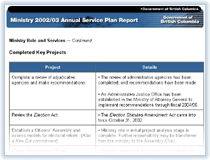 |
Completed New Era Commitments
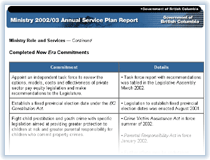 |
Continued New Era Commitments
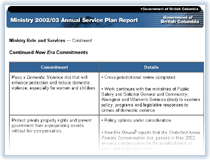 |
Ongoing New Era Commitments — Part of Ministry Mandate
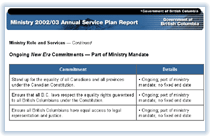 |
Core Business Areas
This section of the Annual Report provides a brief description of the ministry's core business areas as they were during fiscal year 2002/2003. The description for each business area covers purpose, participant branches, programs and services, service delivery mode, principal clients, intended benefits to clients, and a few of the considerations that can affect service delivery.
The Service Plan for 2002/2003 included nine core business areas that had been configured during the 2001/2002 transition year. Several of these business areas incorporated complementary programs and services from more than one ministry branch. Other business areas were the responsibility of single branches. The table below summarizes the business areas for the fiscal year 2002/2003 and the branches that were involved in each of them.
Ministry of Attorney General Core Business Areas — 2002/2003
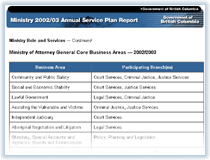 |
Community and Public Safety
Three branches of the ministry — Court Services, Criminal Justice, and Justice Services — contribute to the safety of communities and the general public in different ways.
- The Court Services Branch supports timely and equitable
access to the Provincial Court, Supreme Court and Court of Appeal.
It provides administrative services to the independent judiciary,
registry and trial support, prisoner custody and escort, and courthouse
security. It also maintains the facilities in which court is held.
These services, which are directly delivered by branch and ministry staff, enable the courts to operate safely and efficiently. They contribute to an independent, impartial and accessible justice system that serves the province's citizens — and specifically, parties in litigation, counsel, the judiciary, registry staff, police, public interest and volunteer groups, other ministries, and other governments such as municipal, aboriginal, and federal.
Addressing and resolving criminal cases in the courts involves almost 105,000 sitting hours, which represents almost sixty per cent of the total combined sitting hours for all levels of court.
- The Criminal Justice Branch contributes to public safety
through the prosecution of Criminal Code and provincial
statute offences. Services include assessing and approving criminal
charges, referring low-risk offenders to alternative measures
programs, identifying high-risk and violent offenders for specific
attention, prosecuting cases, handling appeals and providing advice
to government on all criminal law matters. These responsibilities
are governed by the Crown Counsel Act and must be carried
out objectively and fairly, without regard to undue influence
or interference from any source.
Victims, witnesses, the general public and justice partners (police and other investigating agencies, courts, corrections and government) benefit in many ways from these services. The charge assessment process and assessment criteria ensure that the cases which are approved to court are sufficiently supported by the anticipated admissible evidence, and that prosecution will be in the public interest. After assessment, some cases are referred to alternative measures programs, and some that do not warrant charges are not approved to court or are referred back to the police for investigation. This contributes to efficiency as those accused persons who can be adequately dealt with by a referral to an out-of-court alternative measures program are not brought into the court system, and those accused persons who present a high risk of violence are identified early in the process. Cases that do not meet the evidentiary or public interest criteria are not placed before the court. The charge assessment process can reduce the potential for civil suits.
High-risk offenders are identified for appropriate action by the courts, contributing to public safety. Prosecutorial services and advice in criminal matters are offered with careful attention to timely processing, contributing to cost reduction.
- The Justice Services Branch supports the provision of legal aid by the Legal Services Society by managing the broad policy and funding context of legal aid. The Society allocates to eligible individuals who cannot afford legal counsel, legal aid resources proportional to the complexity and seriousness of the offence. The principal responsibilities of this branch lie within other core business areas and are described there.
Workloads and service delivery in this core business area can be affected by several factors discussed previously under Operating Context. If, for example, the crime rate, litigation complexity or court backlogs should increase, workload would also increase, service delivery could become less efficient, and costs would likely rise. This is especially true if extraordinary cases should become more frequent. The implementation of new laws, such as the new national Youth Criminal Justice Act, often requires new and additional procedures that can also increase workloads and affect efficiency.
Since maintaining service delivery levels is a priority, the ministry addresses these and other more catastrophic risks, such as the loss of facilities due to earthquake, fire, or explosion, through risk management and business continuation planning.
Expenditures for Community and Public Safety
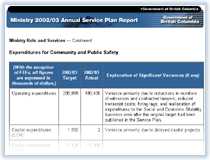 |
Social and Economic Stability
Society requires timely, effective resolution of civil and family disputes, and this fosters social and economic stability. Many civil and family cases require courtroom procedures to reach resolution; Court Services Branch supports the judiciary in addressing these cases. Some civil and family disputes can be resolved out of court; Justice Services Branch offers or funds a range of services and information as well as out-of-court dispute resolution options for those who wish a less adversarial approach.
- As described in the previous section of this report, the Court
Services Branch supports timely and equitable access to the
Provincial Court, Supreme Court and Court of Appeal. It provides
administrative services to the judiciary, registry and trial support,
prisoner custody and escort, and courthouse security. It also
maintains the facilities in which civil and family court events
take place. These services, which are directly delivered by branch
and ministry staff, enable the courts to operate safely and efficiently.
They contribute to an independent, impartial and accessible justice
system that serves the province's citizens — specifically,
parties in litigation, counsel, the judiciary, registry staff,
police, public interest and volunteer groups, other ministries,
and other governments such as municipal, aboriginal and federal.
Resolving civil and family disputes in the courts involves more than 70,000 sitting hours, which represents more than forty per cent of the total combined sitting hours at all levels of court.
- The Justice Services Branch promotes access to justice
services such as legal aid and offers alternatives to courtroom
litigation that emphasize choice, relevancy, affordability and
accessibility. Free mediation for disputants in civil cases is
available in Provincial Small Claims Court through the Court Mediation
Program. In Supreme Court, a disputing party can use the Notice
to Mediate Program to compel the other party(ies) to attend one
mediation session.
Three other programs are available to families (parents, children, other family members) in dispute. The Parenting after Separation Program is a three-hour free information session that is now mandatory at some court registries. The session helps parents make informed choices about separation and conflict and take into account the best interests of their children.
The Facilitated Planning Meeting Program is intended to help families reach early resolution of child protection issues. The Family Justice Dispute Resolution Program guides parents and children through the process of separation and divorce and helps families address issues such as child custody, access and maintenance.
Most of the services, apart from legal aid, are provided by ministry employees and, to a much lesser extent, through independent contractors. Volunteer boards operate some programs. Offering disputants in both civil and family cases a range of out-of-court options creates significant efficiencies in the justice system and reserves the resource-intensive court process for those cases that need it most. Dispute resolution processes benefit disputants by allowing all parties to be engaged actively in creating enduring agreements designed to meet their needs and personal circumstances, rather than having resolution imposed by the court. Clients for dispute resolution services can range from individuals to families, government ministries and agencies, and aboriginal treaty tables.
Several factors influence the ministry's ability to reach certain intended targets for this core business area. Maintaining court services is a priority for this business area. The ministry addresses risks, such as the loss of facilities, through risk management and business continuation planning.
Some civil and family cases are more difficult to resolve than are others, depending on the individual circumstances or nature of a case. If the proportion of difficult cases is high in a given year, the settlement rate for that year may be lower than the rate for a year that had a high proportion of cases that were easily and quickly resolved.
The roster of mediators can fluctuate from year to year, with some years having an influx of newly trained, but inexperienced mediators, coupled with an outflow of experienced mediators. Inexperienced mediators often have a lower settlement rate than do experienced ones. A reduction in the proportion of experienced mediators on the roster may also temporarily reduce access to out-of-court options.
During economically difficult times, disputants may feel additional financial and emotional pressures. Consequently, they are often not as inclined to negotiate and compromise as they are when the economy is strong and they are less pressured.
Expenditures for Social and Economic Stability
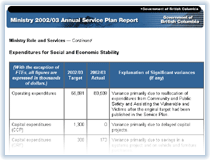 |
Lawful Government
Through the Legal Services Branch, this business area employs in-house and contracted legal staff to advise government on civil and criminal law matters. It fulfills the Attorney General's role as official legal advisor to government. It also negotiates and drafts agreements, drafts legislation and regulations, manages the government's liability risks and costs, represents the government in litigation, and works to reduce the cost of litigation through the use of technology and improved business practices. Its clients are government ministries, the Attorney General, Cabinet, and Crown corporations and agencies. Client ministries partially fund the area through annual agreements.
The area does not provide direct services to the public. However, it does serve the public interest by ensuring that government operates lawfully and that risks associated with government ministry operations are reduced.
Services are delivered through three main programs: Solicitor Services, which advises on lawful operations and risk reduction; Barrister Services, which represents government in litigation and seeks the best possible outcomes; and Legislative Counsel, which provides legal advice to Cabinet and the Legislative Assembly and takes direction from Cabinet.
One objective of this business area is to reduce the province's exposure to liability. Since service delivery levels are determined in large part by ministry budgets, reductions in ministry budgets can reduce ministries' access to timely legal advice. This could have the effect of increasing government's exposure to risk, possibly resulting in an increase in litigation against the government.
Expenditures for Lawful Government
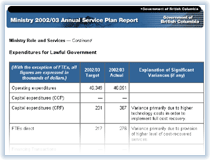 |
Assisting the Vulnerable and Victims
Two of the ministry branches described earlier in this section offer services that fall within this business area.
- The Criminal Justice Branch offers victims of crime the opportunity to provide offence impact information and presents appropriate victim impact information to the court on sentencing. If requested, information about charges, court dates and court outcomes is also provided to victims.
- The Justice Services Branch provides a range of assistance and resolution opportunities for individuals and families involved in the justice system. The branch manages the policy framework of legal aid in such areas as child protection, domestic violence, mental health and immigration. It helps individuals and families manage their disputes in a way that provides timely access to justice, reduces unnecessary litigation and the use of court resources, reduces the cost to government of benefit programs, and promotes the safety and mental health of children whose parents are separating or divorcing.
Three programs available to families in dispute have already been discussed under Social and Economic Stability. They are the Parenting after Separation Program; the Facilitated Planning Meeting Program and the Family Justice Dispute Resolution Program.
A fourth program, the Family Maintenance Enforcement Program (FMEP) facilitates full payment of child and spousal maintenance by monitoring and enforcing all maintenance orders and agreements. Through the program, which is delivered by the private sector, maintenance payments are calculated, received, recorded, and forwarded to the recipient.
If a payor should fall into arrears and enforcement is necessary, federal and provincial laws give the FMEP the authority to use a number of measures, depending on how much money is owing and what the FMEP knows about the payor's current situation. The program can attach income, register a lien against the payor's personal property, and even obtain a court order to seize and sell property of a delinquent payor.
The ability to enforce maintenance orders and collect arrears if needed benefits the vulnerable members of a family that is undergoing separation and divorce. It also benefits government by reducing the demand for supplementary family support.
This business area is subject to many of the same risks around mediator availability as those described for Social and Economic Stability. The ministry mediates the risk through recruitment actions and increased membership on the mediator roster.
Expenditures for Assisting the Vulnerable and Victims
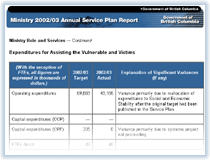 |
Independent Judiciary
The judiciary is comprised of Provincial Court Judges, Supreme Court Justices and Masters, and Court of Appeal Justices. It functions independently of the Legislative and Executive arms of government, but is funded both federally and provincially. The federal government appoints and funds Court of Appeal Justices and Supreme Court Justices. The provincial government funds Provincial Court Judges, Judicial Justices of the Peace and Supreme Court Masters. The province also allocates budget for administrative and support services and funds administration staff, case managers, trial coordinators and support staff.
The Court Services Branch supports this core business area by providing registry operations, court administration, prisoner escort and court security. With Court Services assistance, the judiciary develops specific projects such as the Provincial Court's criminal case flow management process and rules, and the Supreme Court's reforms for expedited case processing.
Improved criminal case flow management rules are intended to bring greater efficiency to courtroom processes by ensuring that court events occur when they are scheduled and that Crown counsel and defence counsel engage in meaningful discussions early in the process.
Risks to this business area would include a loss of judges on the bench due to illness, retirements or non-replacement. If the area operates with reduced numbers, this could reduce the projected number of sitting hours.
Expenditures for Independent Judiciary
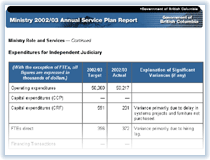 |
Aboriginal Negotiation and Litigation
Services offered in this core business area are similar to those described earlier in this report under Lawful Government, except that the focus is on aboriginal law issues. The Legal Services Branch, by providing sound legal advice through its Solicitor services, supports the treaty negotiation process in achieving its goals and objectives. Barrister services involve representing government and its ministries in aboriginal litigation matters. Principal clients for this business area are ministries and the Treaty Negotiation Office of the Ministry of Attorney General. The area does not provide direct services to the public.
Client ministries are charged for legal services received. Consequently, both access to services and service levels are dependent on client ministry budgets. Funding reductions may limit access to timely and adequate legal advice, possibly rendering ministries less able to avoid legal risks.
Expenditures for Aboriginal Negotiation and Litigation
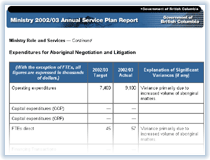 |
Statutory, Special Accounts and Agencies, Boards and Commissions (ABCs)
The purpose of this core business area is to support the operations of agencies, boards and commissions (ABCs) for which the Ministry of Attorney General and the Ministry of Public Safety & Solicitor General are responsible. Responsibilities include administrative and policy support, database management, and management of the Order in Council (OIC) and Ministerial Order (MO) appointment process for both ministries.
This business area also provides contract management and logistical and administrative support to statutory bodies (e.g., commissions of inquiry, Electoral Boundaries Commission, Judicial Compensation Committee, Judicial Justice Compensation Committee ) and to major projects (e.g., the Administrative Justice Project and the Pay Equity Task Force).
Services are delivered by ministry staff and contractors. Clients are the Attorney General, the Solicitor General, the Deputy Attorney General, the Deputy Solicitor General, the Deputy Minister of the Treaty Negotiation Office, ministry branches responsible for specific ABCs, and commissions of inquiry. There are no direct services to the public, although the public does benefit through the actions of the agencies, boards and commissions that have been established in the public interest and which receive ministry support.
Risks that this business area might experience are largely administrative. For example, an unexpected database failure could delay appointment processes. This, in turn, could affect an agency's ability to deliver its services and honour its commitments on time. Additional demands brought about by an increased number of inquiry commissions and/or special projects would likely exceed area capacity and result in diminished services and delays.
Expenditures for Statutory, Special Accounts and ABCs
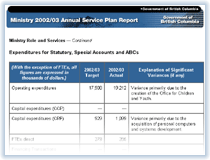 |
Corporate Services for Ministry of Attorney General and Ministry of Public Safety and Solicitor General
This business area provides support services to the ministries of Attorney General and Solicitor General and to the Treaty Negotiations Office (TNO). Included among these services to both ministries and the TNO are financial and resource management, policy and legislation development, facility inspections, corporate planning and reporting, and information technology development. The ministry branches responsible for most of these services are Policy, Planning and Legislation and Management Services.
Corporate Services is often given responsibility for launching new ministry and government justice initiatives — or certain aspects of such initiatives — and developing them to a point where they can be turned over to other areas of the ministry or to other agencies for further action. The Citizens' Assembly on Electoral Reform is one example where Corporate Services oversaw development of a terms of reference to govern the Assembly, which later moved under the auspices of the Legislative Assembly. Another example is the Administrative Justice Project (AJP), one of many justice reform efforts under way in this business area. The AJP reviewed the nature, quality and timeliness of the services that administrative justice agencies such as the Labour Relations Board and the Commercial Appeals Commission deliver to the public. Following the review, a separate Administrative Justice Office was set up to implement recommendations from the review.
Corporate Services also analyses existing policies and legislation and develops new policy or legislation in support of priority initiatives. Through the Management Services Branch, it provides budget development and monitoring; revenue planning; accounting and financial reporting; payment processing; financial control and systems support; and support for procurement, and for contract and risk management. It is also responsible for developing effective technology solutions for the two client ministries. Services are delivered by staff and occasionally by contracted providers.
While there are no direct services to the public, the public interest is served in several ways. For example, criminal justice, civil justice and family justice policies are vital to the public interest and central to the tenets of a democratic society. The development of legislation is a key function of the provincial government. Articulating government direction and priorities through Service Plans and reporting on progress achieved through Annual Reports keep the public informed and the government accountable for its decisions.
This business area moves justice-related initiatives and other government priorities forward through the timely management and delivery of key components for each initiative. A decline in the capacity of this business area, coupled with a growing need and demand for its services, can delay the development and implementation of major government and ministry initiatives and affect the quality of services offered to clients.
Expenditures for Corporate Services for MAG/TNO and MPSSG
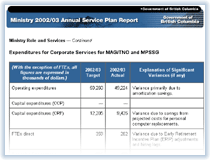 |
Treaty Negotiations Office
This office negotiates and implements treaties and other agreements with First Nations. In doing so, legal certainty regarding the ownership and use of Crown land and resources is clarified, which contributes to economic growth for all British Columbians.
Risks this business area might experience relate to the pace and complexity of negotiations and the uncertainty surrounding agreement closure given the tripartite nature of the treaty process.
Expenditures for the Treaty Negotiations Office
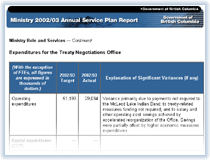 |
 |
||||